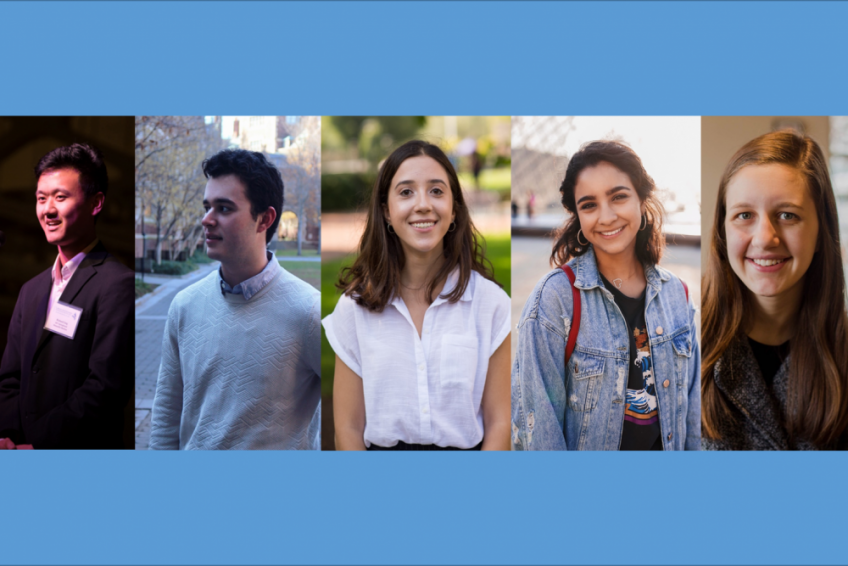Inaugural Recipients of the Shah Family Prize for Innovative Undergraduate Student Projects at the Netter Center
Inaugural Recipients of the Shah Family Prize for Innovative Undergraduate Student Projects at the Netter Center

Richard Ling (E’20, C‘20), Harrison Feinman (C’22), Eva Gonzalez (C’22), Hadeel Saab (C’20), and Anna Waldzinska (C’20)
The Netter Center for Community Partnerships is delighted to announce the two inaugural winners of the Shah Family Prize for Innovative Undergraduate Student Projects at the Netter Center: Richard Ling (E’20, C’20) proposes to advance university-assisted environmental and environmental health education in West Philadelphia schools, which builds upon the work of his nonprofit and Penn club, Sustainable Solutions (SS). Harrison Feinman (C’22), Eva Gonzalez (C’22), Hadeel Saab (C’20), and Anna Waldzinska (C’20) propose to build upon the success of the fall 2018 Penn Leads the Vote (PLTV) re-launch and Professor Emily Falk’s fall 2018 COMM 310 Academically Based Community Service (ABCS) class that worked with PLTV, and will focus on increasing voter engagement at Penn and in the community.
Background/Purpose of Prize
The Netter Center for Community Partnerships provides hundreds of Penn undergraduate students diverse academic, volunteer, and internship opportunities throughout the year that integrate service with research, teaching and learning. Students partner with local schools and organizations to advance literacy, math, science, technology, health and nutrition, college access and career readiness, sports and recreation, or arts and culture. Connecting Penn students with the community through academic partnerships helps develop their leadership, communication, and problem-solving skills, while also contributing to real-world, on-the-ground projects that help improve the quality of life in West Philadelphia as well as improve Penn.
The Shah Family Prize for Innovative Undergraduate Student Projects at the Netter Center enables highly motivated and dedicated Penn undergraduates to further develop, improve, and successfully implement creative civic and community engagement projects. Designed to encourage social innovation and to have sustained positive impacts both on campus and in the local community, the Prize will be awarded to two outstanding projects a year.
Criteria
- The Shah Family Prize is open to all undergraduate students who have taken Academically Based Community Service (ABCS) courses or have been involved in Netter Center programs and want to build upon an existing project.
- Two annual prizes of $5,000 each will be awarded beginning in 2018-2019.
- Students can be nominated through the Netter Center Student Advisory Board, faculty that teach ABCS courses, as well as Netter Center staff.
- Once nominated, students are invited to submit an application that describes their ideas for the project going forward and how they might use the funds to realize these ideas in practice.
- Nominations and applications are reviewed by a committee composed of staff and members of the Netter Center’s Faculty Advisory Board and Community Advisory Board. The committee makes recommendations to the Netter Center director, who selects the final recipients of the Shah Family Prize.
Richard Ling (E’20, C‘20) proposes to advance university-assisted environmental and environmental health education in West Philadelphia schools. This new project builds upon the work of his nonprofit and Penn club, Sustainable Solutions (SS). SS strives to facilitate and implement localized solutions to the UN Sustainable Development Goals (SDGs), with particular emphasis on those that are especially pertinent to Philadelphia's local needs, which include SDG 3 (Good health and well-being), SDG 4 (Quality education), SDG 6 (Clean water and sanitation), and SDG 7 (Affordable and clean energy). The Shah Prize will help expand this work so that Richard can mobilize the vast array of resources across Penn, including ABCS and non-ABCS partnerships, to advance environmental educations partnerships, K-16+, that are focused on learning about the environment through local environmental improvement. SS has developed numerous partnerships with relevant organizations around Philadelphia, including the Penn Water Center, UN Environment, the Kleinman Center for Energy Policy, Essity North America, and The Green Program. The proposed work would connect existing and generate additional ABCS partnerships that would work with specific K12 teachers and schools and build a base for further development.
Harrison Feinman (C’22), Eva Gonzalez (C’22), Hadeel Saab (C’20), and Anna Waldzinska (C’20) propose to build upon the success of the fall 2018 Penn Leads the Vote (PLTV) re-launch and Professor Emily Falk’s fall 2018 COMM 310 ABCS class that worked with PLTV. With the Shah Prize, this group will advance academic partnerships (e.g., ABCS classes, independent study, senior research, and/or thesis projects, etc.) that would focus on increasing voter engagement at Penn and in the community. First, the students will advance their own academic projects, which include: 1) further analyzing COMM 310 data from fall 2018 voter engagement experiment to answer questions about what worked and what didn't to increase voter turnout, to explore the effects of social network composition on voter turnout, and to further probe whether there are other demographics that might be relevant targets for future engagement (e.g., analyzing turnout data by different majors); 2) conducting an analysis on the operational side of what worked and what needs improvement to more effectively reach the Penn community (e.g., exploring options for working with administrators earlier to get better engagement with the dorms; looking at possible connections to Penn's student-wide communication systems such as Canvas and Penn-In-Touch, etc.); and 3) evaluating strategies that are specifically efficacious for younger people to advance civic engagement, democratic development and voter participation. These projects will help them demonstrate to other students and faculty the opportunities for ABCS research and ABCS classes in the areas of civic engagement, democratic development, and voter participation. Second, their work will include meeting with faculty and students across Penn's schools and across many disciplines to cultivate new ABCS partnerships in this area.
For more information, please contact Rita Hodges, Assistant Director of the Netter Center, ritaa@upenn.edu, 215-898-4097.
